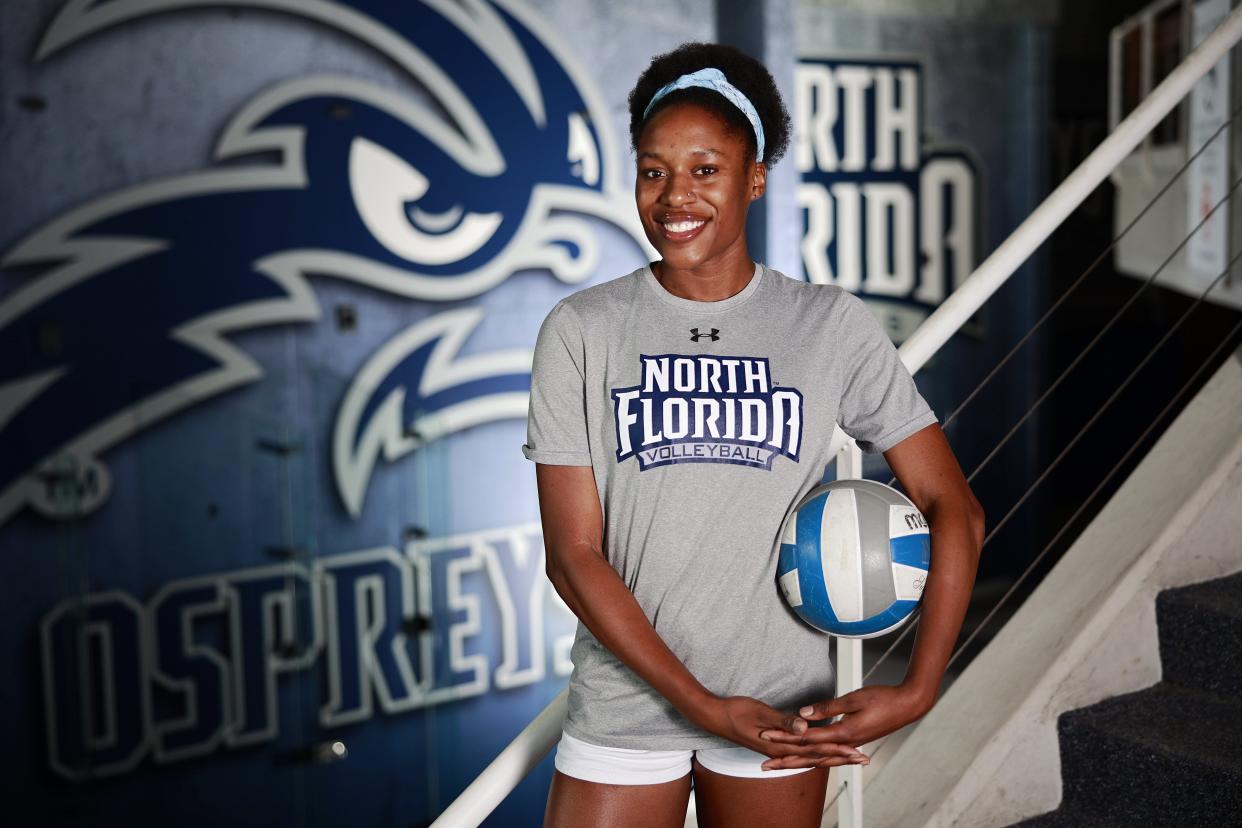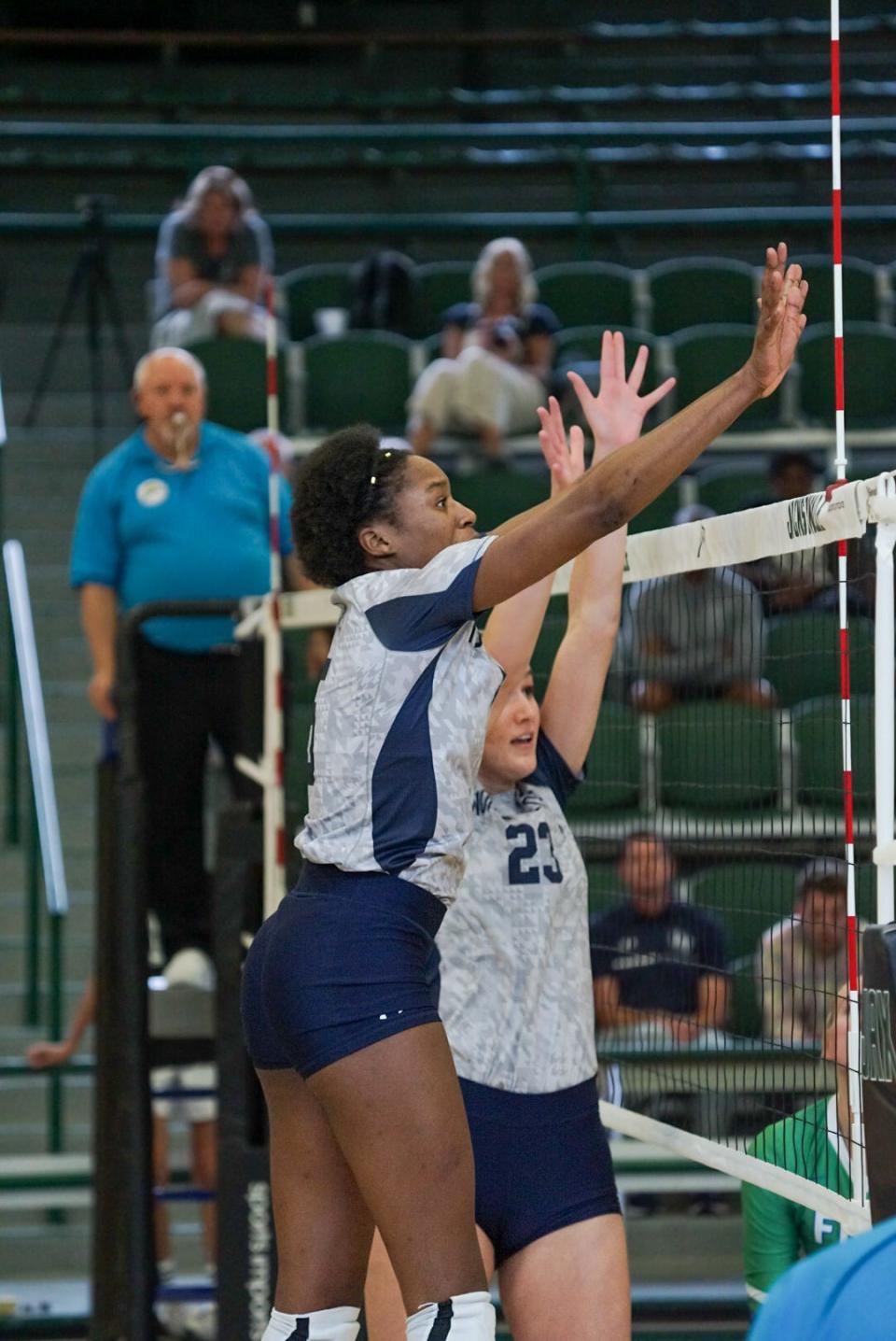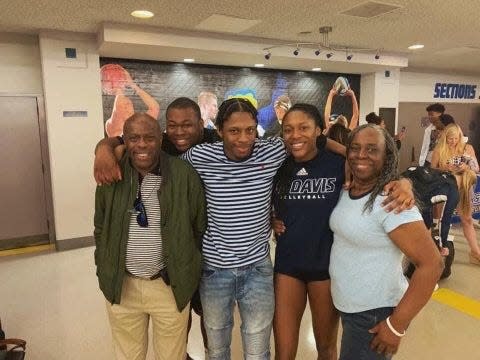UNF volleyball player Mahalia White overcomes cancer and knee injury to chase her dreams

The first symptoms were night sweats.
But Mahalia White passed it off to a University of California-Davis college dorm with inefficient air conditioning and temperatures in the 80s and 90s for most of the late summer and early fall of her freshman season in 2017.
"It was a college dorm," she recalled. "It was hot in there sometimes."
Then came the back pain. Sometimes it was in the lower back, other times in the middle, and other times on the upper part.
White passed that off to being an athlete with the accompanying aches and pains of practice, training and games. She had earned a starting position on the Cal-Davis volleyball team as a freshman and the 6-foot tall outside hitter had a sensational season, earning Big West freshman of the week honors six times and later being named the conference freshman of the year.
And White was used to playing with pain, going back to when she was barely out of her toddler years. White would fall playing games, perhaps scrape her knee, and if she cried, her father Martin would say, "if you can't handle it, get in the house."
"I had some of that old-school in me, probably because of football," Martin White said. "If you get knocked down, you get back up."
"I play hard and I figured a little pain came with playing sports at a high level," she said. "My back would hurt, I would go to rehab, and it could go away, then come back. But it never got worse. I told myself I was fine."
White knew a lot of volleyball players who had disc problems in their back so she soldiered on and despite the pain she was fifth in the Big West and broke the school freshman record with 3.55 kills per set.
But UC-Davis associate head trainer Doug Hess kept at her, asking her to get an MRI.
After the season, she told him.
Finally, on Dec. 3, her 19th birthday, she went to UC Davis Health in Sacramento for the test. White was told they'd have the results in a week.
One day later, Jeremiah Ray, the Cal-Davis athletics head physician, called her and asked her to come to the athletic training office, along with Hess. They showed her the MRI of her back.
What should have been a clear image was colored a bright orange, everywhere, from her neck to her waist.
"I asked them what the orange meant," White said. "They said orange was the worst."
And then they told her the diagnosis.
White had Stage IV Hodgkin's lymphoma.
'It was everything I dreamt of': Florida State's McKenna Keith back in the pool after beating Hodgkin's lymphoma
What is non-Hodgkin lymphoma? Is it curable? What to know after Jane Fonda's diagnosis
Happy and healthy on the First Coast
Five years later, Mahalia White moved cross-country to play for the University of North Florida volleyball team as a graduate redshirt junior.
She leads the Ospreys and is third in the ASUN in kills per set with 3.95, despite missing three matches with what coach Kristen Wright described as a minor injury.
Traveling 2,767 miles from Cal-Davis to UNF is a long way to go to finish her college volleyball career but White is familiar with difficult journeys.
Along the way she has beaten cancer that cost her the 2018 season, bounced back to make the All-Big West team in 2019, missed 2020 when the Big West suspended volleyball due to the COVID-19 pandemic, then missed the 2021 season because of an ACL injury.

"I got a redshirt season, a COVID season, a medical redshirt season --- I've had a lot of seasons," she said with her infectious laugh.
She may also be among the nation's leaders in pure guts and a will to pursue volleyball, her passion since she was a high school freshman in Canoga Park, Calif.
White's father played football at Holy Cross. Her mother Patsy played tennis. As a child, encouraged by her parents, Mahalia White played basketball, flag football, soccer, softball, track and even joined her twin brother Matthew and her older brother Michael in pickup basketball games with their friends, more than holding her own.
"She seemed to be a natural at anything she tried," said her mother, who played tennis at Locke College Prep School in South Central Los Angeles. "We thought with her height she would gravitate towards basketball."
Her father had Mahalia pegged for basketball or track.
"I didn't see volleyball coming," he admitted. "But we were going to support her no matter what she wanted to try."
Revamped arena: New hospitality suite, hardwood court coming to UNF Arena as university marks 50th anniversary
Olympics inspired her
What her parents might not have known is that Mahalia had become fascinated with volleyball when watching the U.S. women play in the 2012 Olympic Games.
And the athletic director at Chatsworth Charter School took one look at White in a gym class early in her freshman season of 2013 and mentioned to her that the volleyball team needed some height.
White discovered a rush in volleyball she hadn't felt in other sports, the speed, the teamwork and finally the art of the spike, or "kills," as they are called.
She dropped every other sport to commit to it full-time.
"I loved it," she said. "In almost every other sport I tried, there were times when things would slow down. It never slows down in volleyball. I like how dynamic and collaborative it is. It's an explosive sport. The explosiveness is what I love."
She was an instant star in high school and went on to become a two-time All-Los Angeles selection. She added three years of club volleyball and then went north to Davis, located near the California capital city of Sacramento.
Despite her stop-start career at Cal-Davis, White still got her degree in communications but discovered that the school fell short of her goals for a master's program: one that combined leadership training with equity, diversity and inclusion programs.
White put her name in the transfer portal and waited.
It wasn't long before Wright saw the name, noted her height, then obtained some film of Cal-Davis matches.
"She was fierce on tape," said Wright, who played at the University of San Diego and has numerous contacts in California. "I did some research, talked to the UC-Davis coaches and found out that she was this incredible human being, so positive and I wondered if it was too good to be true. Everyone said she's the most amazing person they've ever met."
After a visit to Jacksonville, Wright knew White would fit into the UNF culture in every possible way.
"She filled a hole we had on the court, could hit all the shots but she would add even more value as far as leadership and character," Wright said. "And she has been over and above what I expected of her as a player. She's clearly one of the best in the league in terms of scoring, just a dynamic player."
Being an athlete helped recovery
When White heard the word "cancer" from doctors, she was told from the start that they believed she could beat it. She was fortunate in two regards: while it was Stage IV, it was not non-Hodgkin's lymphoma, which has a higher mortality rate past five years.
According to the American Cancer Society, the five-year survival rate for Hodgkin's lymphoma can be as high as 92 percent. Non-Hodgkins is around 70 percent.
The fact that she was 19 years old and an elite athlete also worked in her favor.

"She had a pretty treatable cancer and it didn't hurt that she was in such good physical shape," Hess said. "But the MRI wasn't good. Based on the scans, her pelvis was technically fractured."
Despite being told of the high survival rate, it was still a shock for White to be told she had cancer. And it's a conversation that had already taken place too many times within her family. Mahalia's mother and aunt had breast cancer and her mother had just completed treatment five months before.
When her mother answered the phone, Mahalia couldn't speak because of the sobs that coursed out of her body.
"I heard my mother's voice and I couldn't get anything out," White said. "I just started crying and gave the phone to the doctor."
Patsy White did what mothers do.
She exuded optimism and did her best to calm her daughter's worst fears.
"It was horrible news," she said. "When she called me crying, I knew it was bad. She doesn't usually call me crying. But I learned about her early on, that if I don't show her signs that I'm upset, she won't be upset. UC-Davis Medical Center had excellent doctors, nurses and staff and her teammates and coaches were there for her. She had support around the clock."
Then her mother told her to use her as an example.
"If I could have breast cancer, have a double mastectomy and come out victorious you can too," Patsy White told Mahalia. "And she was more athletic and fit than I would ever be. There were some dark days. I won't fool you. But I knew she'd be a fighter."
Mahlia White said she went to her dorm room that afternoon, gave herself some time to cry and tried to sleep.
"You imagine all the worst," she said. "I was scared, a freshman, living on my own, and you think it's only happening to you. I didn't want to think about it. I only wanted to sleep."
But then she started getting phone calls. Her coaches. Teammates. And they all had variations on the same theme.
We're with you. Her teammates visited her every day, brought food but most importantly brought love.
White couldn't feel sorry for herself if she wanted to. The circle around her was too large.
"I had such a strong support group with them," she said. "They were there for me so much that a lot of times I forgot I was sick."
Hair and weight loss, brittle bones
White began chemotherapy after the holidays, entering UC-Davis Medical center every three weeks, for four days at a time.
One IV bag after another, eight in all, each one sapping her strength and causing the usual list of side effects: she lost 30 pounds, her hair and her bones became so brittle that doctors advised her against doing anything physical and she had severe stomach acid.
Patsy White flew to Davis for every chemotherapy session, holding her daughter's hand every day and into the night.
The initial diagnosis of doctors proved correct. The cancer cells died quickly. The back pain subsided. But White had to complete five rounds of treatment to make sure.
On Easter Sunday of 2018, White walked out of the hospital with her mother after finishing the last chemotherapy treatment.
"How wonderful was that?" Patsy White said. "It was a very happy Easter for our family."
Martin White said his family had been through so much, with his wife and her sister battling breast cancer and his daughter facing the disease, that the reflexive response was to turn it over to a higher power.
"At first you feel so defeated," he said. "She had this amazing season, her Mom has just finished her cancer treatments and then this wet blanket. But it's nothing my wife did, or nothing Mahalia did. What do they say? There are no atheists in foxholes? There's nothing to do but accept it and let God take over."
White said she learned something very valuable during her battle against cancer, something she would gladly pass on to anyone facing the same situation.
"Validate your emotions," she said. "By that I mean don't be afraid to cry for yourself a little. It's better to let it out than hold it in. Don't go internal. But also lean on people who love you the most. Sometimes it's not about doing it yourself."
In those regards, White had her mind and emotions right. Rehabilitating her body would be a much slower process.
At first, she could only do stretching exercises with rubber bands. Later, she could have ridden from L.A. to Jacksonville with the number of miles she put on a stationary bike.
"I was very impatient," she said. "All I wanted was to play volleyball again."
That came in 2019 when Davis returned to the team. She was eighth in the Big West in kills per set, was named all-conference and for good measure made the All-Big West academic team.
It was a heartwarming comeback.
But she would need to make one more.
Knee 'felt like a noodle'
The 2020 COVID-19 pandemic shut down college sports in the spring but in the Big West, that ban continued into the fall as the conference decided not to play volleyball.
White was disappointed but she threw her energy into academics and got her communications degree.
Then during a preseason practice in 2021, White jumped to make a spike, came down and landed awkwardly on her left knee.
"I got up and tried to walk and my leg felt like a noodle," she said.
MRIs showed she tore her ACL.
"I thought, 'dang ... really?'" she said. "In a way, it seemed worse at the time than cancer. But whenever I started to sulk, I would tell myself, 'girl, you beat cancer. This is just another test.'"
White was able to come back in time to play for the beach volleyball team at UC-Davis but with an undergraduate degree in hand, she wanted her Masters and a change of scenery.
She found it on the First Coast.
One more adventure
Patsy White initially wasn't thrilled that her daughter was going across the country but never tried to stand in her way.
"She's always been my adventuresome child," she said. "We worried for a while when she was a baby because she wasn't crawling as fast as her brothers. But on Christmas morning when she was 1, she saw all the bright lights and presents and just got up and walked to the tree. She skipped crawling. She's always been very competitive and wants to do things on her own."
Martin White found himself humming the old Carole King song, "So Far Away," when thinking of the idea of his daughter being nearly 3,000 miles away.
"I looked it at from the greater good standpoint," he said. "It was an academic decision as well as athletic and she really wanted this, for volleyball and for her life after that. We accepted it and supported her totally."
Wright knew from her own experience what it was like to uproot and start a new chapter across the country. But after getting to know the White family, she was confident Mahalia would be comfortable at UNF -- but the school also would benefit from having her in the Osprey Nest.
"She's worked really hard and fought really hard to be where she's at," Wright said. "We knew she would bring a positive vibe to our gym and be a role model. And nothing but positive ever comes out of her mouth. The two words I would always use about her is 'fierce' and 'positive.'"
White said she fell in love with everything at UNF and Jacksonville.
"Coach Wright told me about their whole culture for student-athletes, about developing us as leaders," White said. "I love the campus, the trees ... everything's super-green. And everybody has been welcoming and inviting, from my teammates to the athletic administration, my professors. On my first visit, I got a great sense of who they were and how it would help me as a person by being around them."
White's goal after school is to work in public relations in the areas of diversity, equity and inclusion and she's toying with the idea of being a motivational speaker.
"I would like to work with a start-up company, from the ground floor, where I can show the importance of DEI work," she said.
But for now, she has one more season of eligibility after this and she wouldn't mind playing two consecutive years of college sports in a row for the first time in 2023.
At this point, with what she's endured, nothing seems beyond her grasp. And the next milestone will be in May when if all goes well, she will be cancer-free for five years.
"She has a tremendous amount of fight in her," Wright said. "As a coach, you try to prepare kids for life. They can learn so much through sports. Mahalia is a person who could teach all of us something."
Contact Garry Smits at gsmits@gannett.com and follow him on Twitter @GSmitter
This article originally appeared on Florida Times-Union: UNF volleyball's Mahalia White didn't let cancer, knee injury end dream

